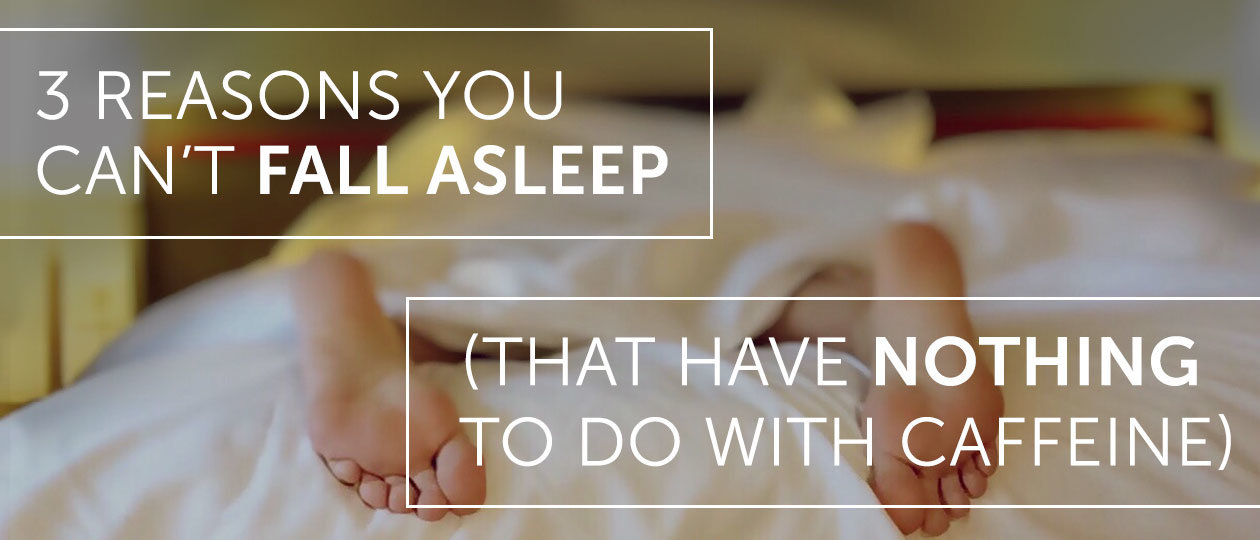3 Reasons You Can’t Fall Asleep (That Have Nothing To Do With Caffeine)
There are few things more frustrating than being unable to satisfy one of our body’s basic needs. In America alone, over sixty million people struggle with insomnia. Since this condition is far more common in adults than in children, I’d guess that about one in every three or four adults will at some point struggle to get a good night’s rest. This post is for all of them. Today, we’re going to start from the top and take a detailed look at how to get the rest we all need. So what exactly is keeping us from falling asleep?
Environmental Factors
If you struggle with insomnia, chances are you’ve already tended to the obvious. You have a comfortable resting place in a dark, and slightly cool room. Your surroundings are quiet, you are not consuming caffeine or sugar too close to bedtime, and you do not have any chronic pain. These, of course, are the first things to get right. You may also want to make sure that your body and bed are clean, and that you don’t have any allergies, for example, to the chemicals used to clean your sheets.
If you still can’t get to sleep, it’s at this point that many people would see fit to turn towards medication. I urge you not to be too hasty in doing this. There’s a trend in our culture toward instant gratification in medicine. Our doctors are trained primarily for pharmaceuticals, so they give you a pill that lets you sleep tonight. But if you do this, you’ll likely need the pills for decades. Pills don’t tend to work well as a long-term solution. In fact, according to one report from the Substance Abuse and Mental Health Services Administration, the number of hospital visits for overdoses of common sleep aids has doubled since 2005. So before we try that, let’s look at the other aspects of this problem we may be able to address.
Anxiety
It’s common wisdom that your stress level and mental state affect your sleep patterns, yet in my experience, medical doctors tend to overlook this side of the problem. So how does this problem work on a physiological level? Well, things like anxiety and worry place our bodies in stress. This state of stress is also known as fight-or-flight, and it’s only supposed to arise when our lives are in immediate danger. The brain releases cortisol and adrenaline to enable us to fight harder or run faster to save our lives. These are powerful stimulants, so naturally, it makes getting to sleep difficult.
The trouble is that this fight-or-flight mechanism is often triggered by things that are not life-threatening. Dr. Michael Lincoln, PhD, wrote that insomnia is often the result of an inability to release the affairs of the day. We all know how to feels to have a sleepless night after some upheaval in our lives, but this can take a chronic, daily form as well if we are unable to let go of the day’s troubles.
Guilt
That same Dr. Lincoln also wrote that insomnia can result from laboring under guilt and fear due to imagined wrong-doings or failures. We tend to think of this as the realm of psychotherapy, not of medicine, but as someone who spent years as a practitioner of counseling and therapy before gravitating to the world of natural health, I promise you that these arenas run inextricably together.
The kind of guilt most likely to make you lose sleep is what I call conscious conflict. It’s when your actions don’t match up to your beliefs; in other words, it means violating your conscience. This could mean that you’ve wronged someone, or it could simply mean you’re not doing what you believe you should. In this case, the best advice I can give you is to be honest with yourself, and to do whatever it takes to set yourself right again. That may mean confessing to someone, asking them to forgive you, or perhaps you need to forgive them. It may be something very small.
Anxiety and guilt produce similar sleeping problems, with anxiety rooted in the future and guilt based on the past. I would advise you to take a moment, retreat to a quiet place with a pencil and paper (or if you’re like me, an iPad pro), and ask yourself what worries you, and what you feel guilty about. Rate everything you can think of from zero to ten. Then start with your highest rated issue, and ask yourself what action you need to take. It may be something meaningful and relational, or something as mundane as taking care of some chore that’s been eating at you, or having some chronic pain checked out. If you succeed in this, you’ll find that the benefits won’t stop at sleep. Physiological peace requires that we give to God all the things we can’t control. If we really do that, we don’t take it back.




Add a Comment